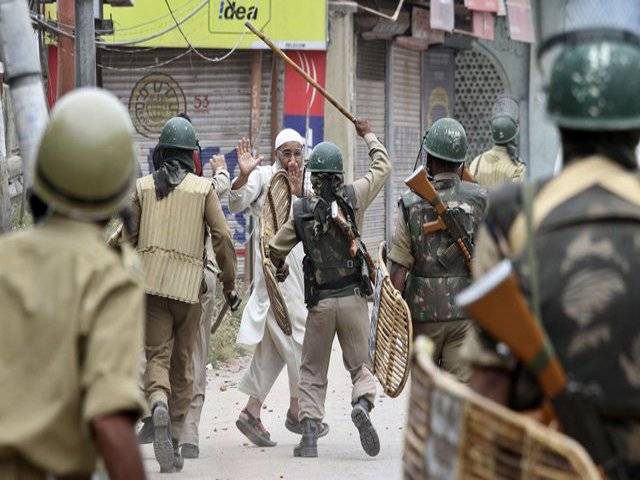Foreign Ministers of Islamic countries Friday voiced concern over the "indiscriminate" use of force by Indian security forces against unarmed civilians in Indian-occupied Kashmir, and urged the international community to help settle the Indo-Pakistan dispute. A communique adopted at the ministerial-level meeting of member states of the Organization of the Islamic Conference (OIC) called for "full respect" for the Kashmiri people's human rights and for providing relief and comfort to them. Dealing with the long-standing Kashmir dispute, the communique said, "The Meeting reaffirmed its principled support to the people of Jammu and Kashmir for the realization of their legitimate right to self-determination, in accordance with the relevant UN resolutions and aspirations of the Kashmiri people. "It emphasized the need for full respect of human rights as well as importance of taking all requisite steps to provide relief and comfort to the Kashmiris. It further called upon India to allow international human rights groups and humanitarian organizations to visit Jammu and Kashmir". Foreign Minister Shah Mahmood Qureshi raised the Kashmir issue at the day-long OIC annual coordination meeting, focusing on the recent events that have seen more than 100 Kashmiri civilians demanding an end to New Delhi's rule gunned down by Indian security forces. "The Meeting expressed concern at the recent and ongoing indiscriminate use of force and gross violations of human rights committed in Indian Occupied Kashmir (IOK) by Indian security forces which have resulted in killing scores of innocent and unarmed civilians as well as injuries to hundreds of others including women, children and elderly. "The Meeting commended the efforts of Pakistan and its readiness to engage with India to resolve all outstanding issues including Jammu and Kashmir dispute and urged the international community to play its due role to settle this long standing dispute on UN agenda for the overall improvement of the relations between Pakistan and India as well as to promote regional peace and stability." Apart from Kashmir, the meeting discussed many other issues of concern to the Islamic world. The meeting adopted the following positions on some of key topics: * Condemned Israel's continued imposition of collective punishment upon the Palestinian people, including in particular the illegal blockade against the Gaza Strip, which has gravely impacted humanitarian conditions. * Demanded that Israel immediately cease its unlawful collective punishment of the Palestinian people, including by completely lifting its blockade of the Gaza Strip. * Deeply regretted and strongly condemned the heinous May 31 Israeli military aggression in international waters against the Gaza-bound convoy of humanitarian assistance Freedom Flotilla, and called for a prompt, credible, independent, impartial and transparent international investigation. * Called for intensification of efforts by the international community, including the Quartet and particularly by the Security Council, to promote the resumption and early conclusion of peace process negotiations aimed at ending the occupation of the Palestinian Territory, including East Jerusalem, and other Arab territories occupied by Israel since 1967, and the achievement of a just, lasting and peaceful settlement of the question of Palestine and the Arab-Israeli conflict as a whole, in accordance with relevant UN resolutions. * Strongly condemned Israels policy of refusing to comply with Security Council resolution 497 (1981) concerning the occupied Syrian Golan and its policies of annexation, building of colonial settlements, confiscation of land, diversion of water sources and imposition of Israel nationality upon Syrian citizens. Demanded Israel to completely withdraw from the occupied Syrian Golan. * Urged the international community to continue their help to the people and Government of Afghanistan in fighting terrorism, counter the drugs problem, achieve security, stability, as well as comprehensive and sustainable development. * Condemned the mounting trend of Islamophobia and systematic defamation of Islam as well as discrimination against Muslims including measures like the ban on constructions of minarets, the opposition to the construction of a mosque in New York City, organization of events and other discriminatory measures that incite religious hatred, such as the call to organize Burn a Koran Day, and called upon the international community to exert efforts to prevent incitement to hatred and discrimination against Muslims and to take effective measures to combat the defamation of religions and negative stereotyping of people on the basis of religion, faith or race.
Saturday, April 20, 2024
Islamic FMs back Kashmiris' rights; deplore Indian soldiers' use of force

DC for timely preparations for heavy rains
April 20, 2024
Sargodha commissioner orders shifting cattle out of city
April 20, 2024
Oil jumps, equities fall as Iran blasts fan Mid East fears
April 20, 2024
A Tense Neighbourhood
April 19, 2024
Dubai Underwater
April 19, 2024
X Debate Continues
April 19, 2024
Hepatitis Challenge
April 18, 2024
IMF Predictions
April 18, 2024
Kite tragedy
April 19, 2024
Discipline dilemma
April 19, 2024
Urgent plea
April 19, 2024
Justice denied
April 18, 2024
AI dilemmas unveiled
April 18, 2024
ePaper - Nawaiwaqt
Advertisement
Nawaiwaqt Group | Copyright © 2024





